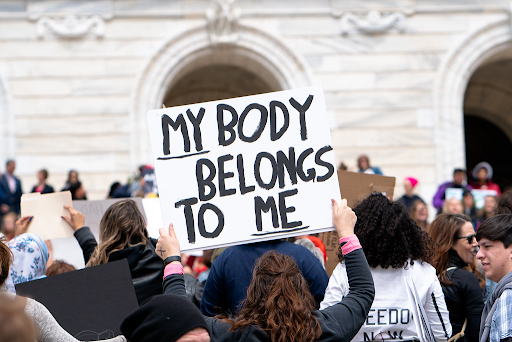Texas Abortion Ban: A War Against Women
OPINION

“My Body Belongs To Me sign at a Stop Abortion Bans Rally in St Paul, Minnesota” by Lorie Shaull. Licensed under CC BY-SA 2.0.
On Wednesday, September 1st, Texas officials passed a new restrictive law on abortions that put executive power into the hands of civilians. Women have once again had their civil rights threatened and their voices silenced.
The law referred to as the “Texas Heartbeat Act,” states that a woman cannot receive an abortion once cardiac activity is detected. If the woman violates this law, “private civil right of action” will occur, meaning civilians can sue anyone involved in providing the abortion without proof of connection to the prosecuted party.
“This is a harmful bill that will not stop abortion; it will simply make it more unsafe,” says senior Melissa Liguori.
Research from the Guttmacher Institute shows that abortion rates are roughly the same in countries where abortion is legal and countries where it isn’t. This is because when restrictive laws on abortion are put in place, women begin to seek out alternative methods to terminate their pregnancy.
“A lot of abortions are going to become underground,” Liguori says, “they’re going to happen unsafely.”
According to the World Health Organization, between 4.7 and 13.2 percent of maternal deaths each year are due to unsafe abortions, and seven million women end up hospitalized due to complications during an abortion. The WHO recommends that any woman seeking an abortion should go to a licensed professional, which is now very difficult for women in Texas.
“As a result of this new law there are a lot of people who have to go out of state if they choose to have an abortion,” said U.S. Government and Politics teacher Mr. Walter Caskie.
However, for the women that cannot cross state lines to receive the care they need, some doctors are willing to take the risk of providing a safe abortion. Texas doctor Alan Braid recently admitted in a Washington Post article to terminating a woman’s pregnancy, and he is now facing multiple lawsuits. This is the first time that this law has taken action, and people are questioning its constitutionality.
“I fully understood that there could be legal consequences – but I wanted to make sure that Texas didn’t get away with its bid to prevent this blatantly unconstitutional law from being tested,” said Braid.
The Texas Heartbeat Act is accused of being unconstitutional because of the ruling of Roe v. Wade, a pivotal case in women’s history. This case ruled that a woman has the right to an abortion until the fetus is viable, about 22-24 weeks. Supporters of this law claim that it is not in violation of Roe v. Wade because it is executed in civil court.
“It’s really one of the first times this has been done,” said Mr. Caskie. “The legal system allows for people to air their differences in court.”
Since cases of this nature are in the hands of civilians, the motivations driving people to sue others can trail beyond justice and morals. Now more than ever, politics find its way into every social dilemma, and this issue is no different.
“Historically,…it’s generally been about a difference of opinion between religious groups and pro-choice advocates,” said Mr. Caskie. “It seems like everything today is much more political than it used to be.”
In recent years, politics and morals have blended, creating a tense and partisan political climate. However, there are still many people fighting this law based on their morals alone. Not everyone has succumbed to the pressures of different political parties. Many women are speaking out against this ban due to its callous and broad nature. The Texas Heartbeat Act is facing criticism because it offers no exceptions for cases of rape or incest.
“There’s no limitation to what this policy extends to,” said senior Mia Lombardi.“Having a 13-year-old have a child is not something that most mothers want for their daughters.”
The Texas Heartbeat Act is another attempt at stripping women of their bodily autonomy. The war against women has been raging on for decades with motivators ranging from religion to morals to political views. However, the choice to decide what happens to one’s body is a natural right that cannot be taken away.
“I don’t think this law will be in place for long because there are so many people that don’t agree with this,” Lombardi says, “there are a lot of angry women.”










